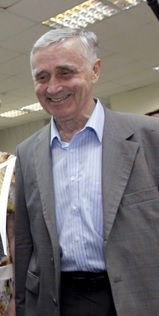Alexander Skrinsky
 Alexander Nikolayevich Skrinsky (Скринский, Александр Николаевич) (born 15 January 1936) is a Russian nuclear physicist.
Alexander Nikolayevich Skrinsky (Скринский, Александр Николаевич) (born 15 January 1936) is a Russian nuclear physicist.He was born in Orenburg and was educated at the high school in the city of Gorky and then at the Lomonosov Moscow State University.
In 1957 he joined the laboratory of Gersh Budker, which was a part of the I. V. Kurchatov Institute of Atomic Energy (now the Kurchatov Institute). Since 1962, Skrinsky has been connected with the Budker Institute of Nuclear Physics, where he was director from 1977 to 2015.
Skrinsky made a significant contribution to the development of the physics of accelerators and high-energy physics (in particular, he developed a method of colliding beams, he participated in the creation of new types of colliders in electron-electron, electron-positron and proton-antiproton beams).
In 1964, together with Budker, he developed the foundations of the method of colliding beams, on the basis of which the world's first VEP-1 collider was created at the Institute of Nuclear Physics of the Siberian Branch of the Academy of Sciences of the USSR for experiments in the physics of elementary particles and a series of studies on quantum electrodynamics was carried out. In 1966 an electron-positron collider VEPP-2 was constructed, experiments on which yielded valuable results on the physics of vector mesons and other hadrons. Later, the method of colliding beams became the basis of modern high-energy experimental physics; In particular, based on the technology of the colliding beams method, the Large Hadron Collider was built.
On November 26, 1968 he was elected a corresponding member, and on December 24, 1970 a full member, of the Academy of Sciences of the USSR (since 1991 the Russian Academy of Sciences) in the Division of Nuclear Physics (High Energy Physics). He is also a full member of the American Physical Society (1999) and a foreign member of the Royal Swedish Academy of Sciences (2000).
Skrinsky was a member of CERN's (European Organization for Nuclear Research) Scientific Policy Council between 1986 and 1992. Provided by Wikipedia
-
1by Mohammad M. Alsharo’a, Charles M. Ankenbrandt, Muzaffer Atac, Bruno R. Autin, Valeri I. Balbekov, Vernon D. Barger, Odette Benary, J. Roger J. Bennett, Michael S. Berger, J. Scott Berg, Martin Berz, Edgar L. Black, Alain Blondel, S. Alex Bogacz, M. Bonesini, Stephen B. Bracker, Alan D. Bross, Luca Bruno, Elizabeth J. Buckley-Geer, Allen C. Caldwell, Mario Campanelli, Kevin W. Cassel, M. Gabriela Catanesi, Swapan Chattopadhyay, Weiren Chou, David B. Cline, Linda R. Coney, Janet M. Conrad, John N. Corlett, Lucien Cremaldi, Mary Anne Cummings, Christine Darve, Fritz DeJongh, Alexandr Drozhdin, Paul Drumm, V. Daniel Elvira, Deborah Errede, Adrian Fabich, William M. Fawley, Richard C. Fernow, Massimo Ferrario, David A. Finley, Nathaniel J. Fisch, Yasuo Fukui, Miguel A. Furman, Tony A. Gabriel, Raphael Galea, Juan C. Gallardo, Roland Garoby, Alper A. Garren, Stephen H. Geer, Simone Gilardoni, Andreas J. Van Ginneken, Ilya F. Ginzburg, Romulus Godang, Maury Goodman, Michael R. Gosz, Michael A. Green, Peter Gruber, John F. Gunion, Ramesh Gupta, John R Haines, Klaus Hanke, Gail G. Hanson, Tao Han, Michael Haney, Don Hartill, Robert E. Hartline, Helmut D. Haseroth, Ahmed Hassanein, Kara Hoffman, Norbert Holtkamp, E. Barbara Holzer, Colin Johnson, Rolland P. Johnson, Carol Johnstone, Klaus Jungmann, Stephen A. Kahn, Daniel M. Kaplan, Eberhard K. Keil, Eun-San Kim, Kwang-Je Kim, Bruce J. King, Harold G. Kirk, Yoshitaka Kuno, Tony S. Ladran, Wing W. Lau, John G. Learned, Valeri Lebedev, Paul Lebrun, Kevin Lee, Jacques A. Lettry, Marco Laveder, Derun Li, Alessandra Lombardi, Changguo Lu, Kyoko Makino, Vladimir Malkin, D. Marfatia, Kirk T. McDonald, Mauro Mezzetto, John R. Miller, Frederick E. Mills, I. Mocioiu, Nikolai V. Mokhov, Jocelyn Monroe, Alfred Moretti, Yoshiharu Mori, David V. Neuffer, King-Yuen Ng, James H. Norem, Yasar Onel, Mark Oreglia, Satoshi Ozaki, Hasan Padamsee, Sandip Pakvasa, Robert B. Palmer, Brett Parker, Zohreh Parsa, Gregory Penn, Yuriy Pischalnikov, Milorad B. Popovic, Zubao Qian, Emilio Radicioni, Rajendran Raja, Helge L. Ravn, Claude B. Reed, Louis L. Reginato, Pavel Rehak, Robert A. Rimmer, Thomas J. Roberts, Thomas Roser, Robert Rossmanith, Roman V. Samulyak, Ronald M. Scanlan, Stefan Schlenstedt, Peter Schwandt, Andrew M. Sessler, Michael H. Shaevitz, Robert Shrock, Peter Sievers, Gregory I. Silvestrov, Nick Simos, Alexander N. Skrinsky, Nickolas Solomey, Philip T. Spampinato, Panagiotis Spentzouris, R. Stefanski, Peter Stoltz, Iuliu Stumer, Donald J. Summers, Lee C. Teng, Peter A. Thieberger, Maury Tigner, Michael Todosow, Alvin V. Tollestrup, Yağmur Torun, Dejan Trbojevic, Zafar U. Usubov, Tatiana A. Vsevolozhskaya, Yau Wah, Chun-xi Wang, Haipeng Wang, Robert J. Weggel, K. Whisnant, Erich H. Willen, Edmund J. N. Wilson, David R. Winn, Jonathan S. Wurtele, Vincent Wu, Takeichiro Yokoi, Moohyun Yoon, Richard York, Simon Yu, Al Zeller, Yongxiang Zhao, Michael S. ZismanGet full text
Published 2003-08-01
Article
